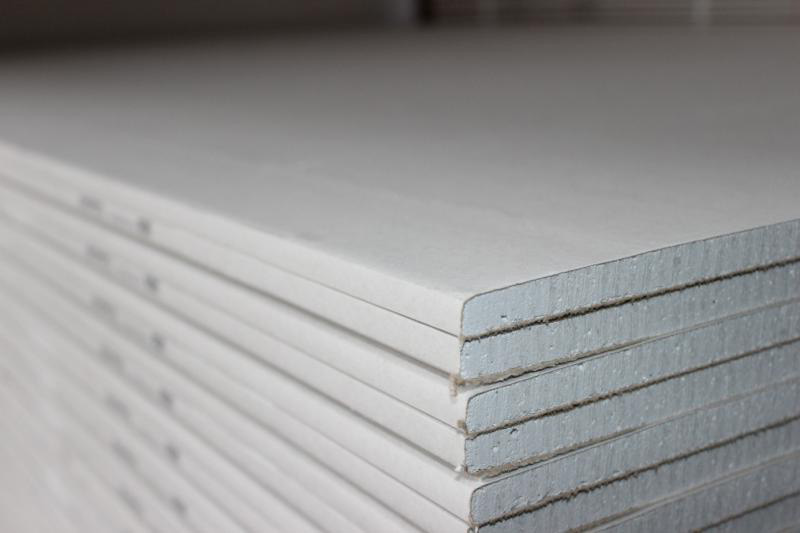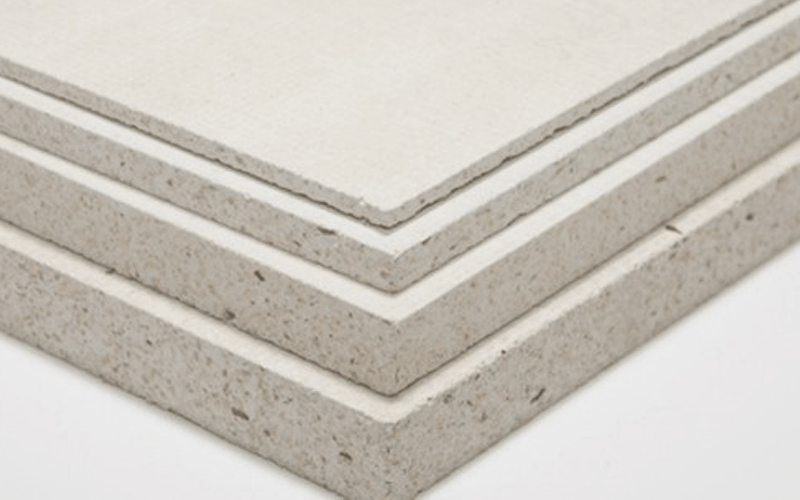Comparison of plasterboard with similar materials:
Comparing plasterboard with cement panels in terms of cost, performance, and durability in the construction industry is one of the most important decisions that can have a significant impact on the quality, cost, and timeline of a project. This article will compare plasterboard with other similar materials such as cement panels and wood in terms of cost, performance, and durability. Additionally, the advantages of plasterboard over these materials will be thoroughly examined.
Gypsum board:
Gypsum board, also known as drywall, is one of the most common building materials in dry construction systems. These boards are made of a gypsum core covered with two layers of paper. Gypsum boards are produced in various types, including moisture-resistant, heat-resistant, and moisture and heat-resistant, each suitable for specific applications.
Plaster Cost:
One of the most important advantages of plaster is its relatively low cost. The production of this product is done with abundant and inexpensive raw materials, ultimately resulting in a lower finished price compared to many other materials. Additionally, the quick and easy installation of plaster reduces labor costs. In comparison to cement and wood panels, plaster usually has a lower cost, which can have a significant impact, especially on large projects.
Gypsum Board Efficiency:
In terms of efficiency, gypsum board has many advantages. This product is lightweight, easily portable, and installable. Cutting and shaping gypsum board is also very easy and does not require complex tools. These characteristics make gypsum board a suitable option for interior walls, ceilings, and even column coverings. Additionally, due to its suitable thermal and acoustic insulation, gypsum board helps improve the quality of the building's interior environment. Another advantage of gypsum board efficiency is its compatibility with various building systems and equipment. This product easily integrates with lighting systems, HVAC, and other building equipment. This flexibility makes gypsum board an ideal choice for various projects, including renovation and new construction.

Durability of Gypsum Board:
The durability of gypsum board is generally excellent in dry environments. This material can withstand typical indoor conditions, including fluctuations in temperature and humidity. However, gypsum board is susceptible to direct and prolonged exposure to moisture. For this reason, it is advisable to use moisture-resistant varieties in humid environments or areas exposed to water. Furthermore, gypsum board is not resistant to severe impacts or mechanical pressure, and it may crack under sudden force.
Cement Boards:
Cement boards are a type of building material commonly used for walls and ceilings. These panels are composed of a mixture of cement and various mineral materials. Due to their distinctive properties, they are often utilized as an alternative to drywall.
Cost of Cement Panels:
The cost of cement panels is generally higher than that of gypsum board. This product is made from more expensive raw materials, and its production process is also more complex. Additionally, the installation of cement panels requires skilled labor and specialized tools, which can further increase the overall project costs. Consequently, compared to gypsum board, cement panels may be less suitable for projects with a limited budget.
The Efficiency of Cement Panels
Cement panels are an excellent choice for humid environments, such as bathrooms, kitchens, and exterior walls, due to their high resistance to moisture and water.
Additionally, these panels are fire-resistant, which can enhance the safety of buildings. However, their heavier weight and the requirement for specialized tools during installation may limit their practicality in certain projects.
Compared to gypsum boards, cement panels offer greater resistance to environmental conditions; however, their installation is more time-consuming and complex. This complexity can result in higher labor costs and extended project timelines.

Durability of Cement Panels:
The durability of cement panels is exceptionally high. This product exhibits strong resistance to environmental factors such as moisture, heat, and mechanical pressure, allowing it to be used for many years without requiring major repairs. Additionally, cement panels are resistant to insects and mold, making them an ideal choice for harsh environments and adverse weather conditions.
Advantages of Gypsum Board Compared to Cement Panels:
Considering all aspects, gypsum board offers several advantages over cement and wooden panels for the following reasons:
Gypsum board is more cost-effective than cement panels regarding initial costs and installation. This advantage is especially significant in large projects with constrained budgets.
Quick and Easy Installation: Gypsum board can be installed quickly due to its lightweight nature and ease of cutting, eliminating the need for skilled labor or complex tools. This characteristic significantly reduces both execution time and costs.
High Flexibility: Gypsum board easily adapts to various construction and installation systems and can be utilized in diverse designs. This product is particularly well-suited for creating smooth and seamless walls, thereby enhancing the quality of the indoor environment.
Proper Performance in Indoor Environments: Gypsum board serves effectively as both a thermal and acoustic insulator, enhancing the quality of life in residential and office spaces. Furthermore, gypsum board is fire-resistant, contributing to the overall safety of buildings.
Sufficient Durability Under Normal Conditions: Although gypsum board is susceptible to damage in humid environments, it demonstrates acceptable durability under typical indoor conditions. Utilizing moisture-resistant varieties can significantly mitigate this vulnerability.
Conclusion:
Overall, gypsum board is a widely used and practical building material that offers several advantages over cement panels in various construction projects, including cost-effectiveness, efficiency, and durability. With its diverse features and high functionality, gypsum board is an excellent choice for walls, ceilings, and interior decoration. Opting for gypsum board can help lower costs, accelerate project completion, and enhance the quality of the indoor environment.